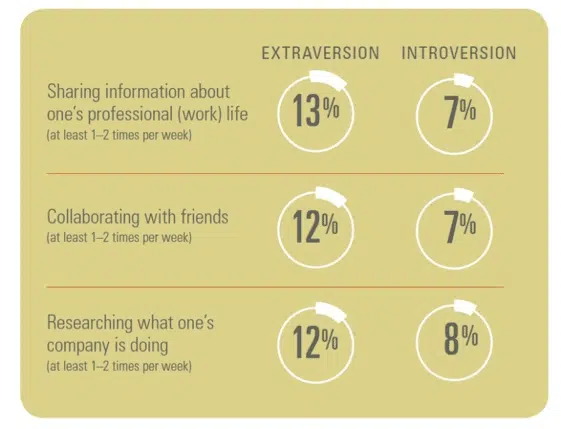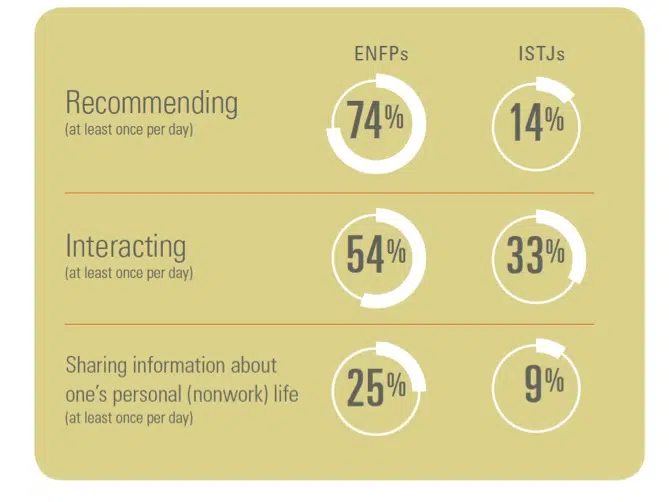Understanding social media habits is derived from understanding your own personality type. Myers-Briggs type indicator (MBTI) is a self-examining survey designed to indicate psychological preferences on how people perceive the world and make decisions. Do you know who makes up your social media audience? Who is listening when you communicate through social media? Most importantly, what types of people are inclined to participate in social media engagement? It turns out that there are a number of factors that influence whether or not a person interacts with social media, how often they tune in, and even which platforms they use. There’s even some science helping us understand who might be listening. If you don’t already know your MBTI you can take this short quiz to determine your personality type. Next, you can read your personality description on The Myers-Briggs Foundation’s website.
In relation to social media marketing, determining a target market’s MBTI can be essential to understanding what makes them want to engage with a post. While Myers-Briggs breaks individuals into 16 distinct categories, each person will fall into one of two main types: (E) extrovert or (I) introvert. Across a number of topics, extroverts were much more likely to be positive about social media and actively engaged.
After determining one’s personality type we can look at the 16 types and from that conclude how you are most likely to engage on social media. The data CPP, Inc. found in 2011 concluded that personality type does matter in some social media areas.
When compared to introverts, extroverts are more likely to regard social media as a good way to meet people. They consider it a good way to interact with individuals who share similar interests. Extroverts also perceive social media as a good way to stay connected with the world and connect professionally. Introverts, on the other hand, were slightly more likely than extroverts to regard social media as a waste of time.
When it comes to specific interactions on Facebook, extroverts were about 1.5 times as likely to engage than introverts.
Image Via CPP
These differences became even more significant when the personality types were broken down into the specific 16 groups, with extroverts of the ENFP type and ISTJ type. Introverts displayed the most dramatic differences.
Image Via CPP
Many of us tend to regard our social media activities differently than how we would approach our communication in an interpersonal group. So, while extroverts are more likely to be engaging on social media, that does not necessarily mean an introvert will act in the same manner when comparing to social group communications.
Imagine you are at a birthday party. You would employ different engagement styles and techniques. Different tones would call for different interactions. The same theory applies to social media engagement. Your social media communications cannot all happen in the same tone and on the same level. The extroverted individuals will most likely share at great length if you’re able and willing to listen. On the other hand, introverts may need some introducing and need to be prompted with questions before they’re ready to open up and share.
While the introverts may tend to watch more than interact at the party, it seems the same is true on social media. When you receive comments, likes, and shares on your social media posts, it’s entirely likely you’re hearing much more from your social media extroverts. Don’t forget that your more introverted followers are listening even though you don’t see it in likes and shares. Your willingness to respond to comments is particularly important to the more introverted followers in your group, as this encouragement may reward them for their involvement and encourage them to engage more.
Taking into consideration the different personality types in your audience, it’s also good to remember to include a variety of posts. You may hear more from your extroverted audience while the introverted individuals may be reacting to other types of posts without directly sharing back information.
Of course, different types of companies and organizations will attract a different blend of the 16 personality types among their customers, prospects, and social media audiences. Predictive logarithms help clients understand their customers and followers, which better equips marketing strategists to convey an effective plan to sell or promote products/services. Today’s Business creates content strategies that will engage specific target markets for certain clients. This form of marketing is heavily dependent on the engagement it gets from everyday individuals whether it is through Facebook, Twitter, Instagram, Pinterest, LinkedIn, or Google+. Future content creation can be developed with a target market’s MBTI in mind, which could overall help engagement rates for clients.

